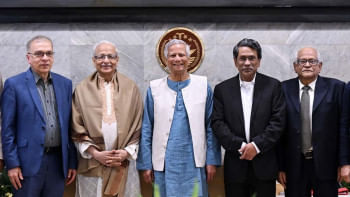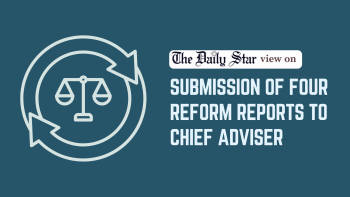What should we expect from a national constitutional council?

The Constitutional Reform Commission submitted its report to Chief Adviser Prof Muhammad Yunus on January 15, proposing a number of recommendations to bring significant changes to the constitution of Bangladesh. Among the most notable recommendations is the creation of a constitutional body called the National Constitutional Council (NCC). The goal of forming this body is to establish checks and balances among constitutional organs, preventing the concentration of power in any single individual or institution. The recommendation is rooted in Bangladesh's recent experience with 15-plus years of authoritarian rule, during which the constitution was repeatedly misused to suppress dissent. The proposed NCC is expected to curtail the prime minister's extensive powers, restore institutional balance, and oversee the formation of interim governments.
The concept of NCC appears to draw inspiration from constitutional councils in other jurisdictions, which serve as guardians of constitutional principles. Originating in France, the idea of a constitutional council has parallels with, but differs from, the constitutional court model found in countries like South Africa and Colombia. A few nations have adopted the constitutional council framework. For instance, it is viewed as a quasi-political entity in Cameroon, a fully political body in France, and a body composed of senior public officials in Cambodia. Within South Asia, Sri Lanka and Nepal have implemented similar models. In Nepal, the constitutional council primarily focuses on recommending appointments to constitutional positions, promoting gender and inclusive representation, and formulating guidelines for nominations. However, the council in Nepal has faced criticism for partisan decision-making and difficulties in achieving consensus. The requirement for majority approval in a politically fragmented environment often leads to delays in appointments. While recent amendments have aimed to enhance procedural transparency, they have also sparked allegations of increasing executive dominance.
Given that Bangladesh's constitution, under Article 102, already vests extensive judicial review powers in the High Court Division, which includes the authority to interpret the constitution and review executive actions, adopting the NCC model instead of a constitutional court seems prudent. The NCC would not have judicial functions, but would complement the judiciary's robust review powers, making it a sensible and promising approach.
The proposed composition of the NCC is noteworthy, bringing together representatives from various constitutional organs. It includes the president, the prime minister, the leader of the opposition, speakers of both houses of parliament, the chief justice, deputy speakers from both houses nominated by the opposition, and one member elected by a majority vote of all legislators, excluding the prime minister, the opposition leader and their party members. In coalition governments, this additional member would be elected by members of coalition parties, excluding the prime minister's party. If parliament is dissolved, the NCC would continue functioning, consisting of the president, the chief adviser, the chief justice, and two advisory council members chosen by the chief adviser. This representative structure mirrors aspects of constitutional councils in Nepal (Article 284) and Sri Lanka (Article 41A). The Sri Lankan model highlights the inclusion of civil society members to minimise political influence in the appointment process. In contrast, the composition of the proposed NCC does not incorporate this feature, setting it apart from the Sri Lankan model in this regard.
Additionally, the NCC would remain operational during interim governments and periods when the parliament is dissolved. This continuous operation is designed to address extraordinary constitutional crises, such as the one triggered by the abrupt departure of former Prime Minister Sheikh Hasina on August 5, 2024 amid widespread protests. The NCC's ongoing presence would enable it to manage unforeseen constitutional challenges effectively.
The NCC would play a pivotal role in appointing individuals to significant constitutional positions. It would advise the president on appointments to key roles, including the chief election commissioner and other election commissioners, the attorney general and additional attorney generals, the chairpersons and members of the Public Service Commission, Anti-Corruption Commission, and National Human Rights Commission, as well as the chiefs of the defence forces and other positions prescribed by law. This advisory role would limit the scope of Article 48 (3), which currently requires the president to act on the prime minister's advice in these appointments. By reducing the prime minister's unilateral authority, the NCC would introduce greater transparency and promote democratic practices. This mechanism is similar to the appointment roles of constitutional councils in Nepal and Sri Lanka. Furthermore, the NCC would be responsible for selecting advisers for interim governments formed after the dissolution of parliament.
For Bangladesh, establishing the NCC has the potential to strengthen democratic institutions and address systemic governance challenges. Functioning as a quasi-political entity rather than a judicial body, the NCC could serve as a constitutional guardian, similar to the role of constitutional councils in other nations. Entrusted with upholding and preserving constitutional principles, the NCC has the potential to enhance governance and reinforce democracy in the country.
Barrister Khan Khalid Adnan is advocate of the Supreme Court of Bangladesh, fellow at the Chartered Institute of Arbitrators, and head of the chamber at Khan Saifur Rahman and Associates in Dhaka.
Views expressed in this article are the authors' own.
Follow The Daily Star Opinion on Facebook for the latest opinions, commentaries and analyses by experts and professionals. To contribute your article or letter to The Daily Star Opinion, see our guidelines for submission.


 For all latest news, follow The Daily Star's Google News channel.
For all latest news, follow The Daily Star's Google News channel. 









Comments